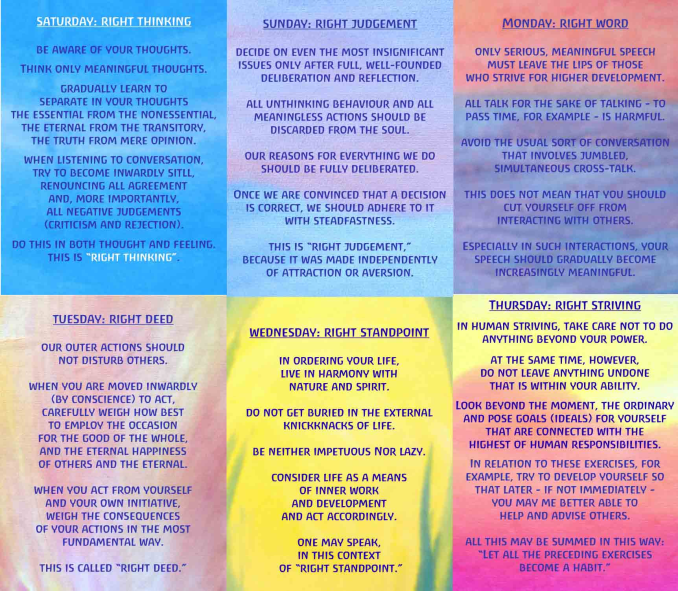lorenzop wrote: ↑Mon Dec 18, 2023 4:18 pm I use the word 'knowable' as in - in principle, there are no inherent barriers to knowledge. So yes, knowledge of past and future lives is possible.
My question has been re the value\utility of this knowledge, other than the sensational. And whether it's worth the years and decades of time that may be required.
We can assume our psycho-physiology has impurities, whether we wish to think of these impurities as chemical, structural, or distortions in a whirlpool. We can think of our 'spiritual duty' to purify our psycho-physiology.
We have multiple techniques of mediation, yoga, diet, prayer, devotion, etc. intended for purification. We don't need to dig into past lives. For example, if we task ourselves with cleaning the dining room table, we have methods of cleaning the table. We don't have to examine each stain and crumb . . . where did this crumb come from . . .
BTW, what's missing from this thread is a reference to a body of work, a 'pool of experts', with how to access and learn from past lives, how to put this info to spiritual use here and now, and narratives of success stories. Its possible Steiner may have written\spoken on this topic, but he may have had special powers and may be a one-of-a-kind, or he may have been psychotic.
Yes, but every technique for purification you mention above begins with thinking activity. I don't think it's necessary to explain much further how we need to use our thinking to approach meditation, yoga, prayer, etc. in a fruitful way. None of these things get off the ground, are sustained, or adapted to changing circumstances without that activity.
The only question is whether we have any interest in purifying the thinking tool that we use to engage in every other form of purification. It is the exact opposite of examining each stain and crumb - it is examining the archetypal patterns of being that lead us to keep dirtying the table in the first place. Each time we have to clean the table it is like a reminder that our underlying spiritual activity remains so imperfect that we are caught in an endless loop of dirtying and cleaning tables. That is essentially what reincarnation is - we get entangled in certain unhealthy patterns of meaningful activity and keep precipitating new sensory worlds for opportunities to 'clean up' the stains of that activity. If we miss those opportunities or don't make much use of them, then we repeat the whole process and precipitate a very similar sensory experience in the next iteration, which provides similar opportunities. We keep examining the stains on the table and trying to wipe them off, to compensate for them.
It is easy to see that this work goes much more smoothly and efficiently if we gain a higher vantage point on the stains and how they precipitate from our activity. If we are stuck in a labyrinth, stumbling through the corridors and making random turns to find our way out via trial and error, it will take us much longer to exit the cycle than if we can lift to a bird's eye view and discern the holistic patterns of the labyrinth that we were previously flowing through in a purely horizontal way, with a blindfold on and hands tied behind our backs. That is what investigating higher spheres and past lives is in the sense of spiritual science. It is finding the creative and moral ways to navigate the sensory labyrinth in an ever-more lucid, nimble, and encompassing way, so that humanity exits the cycle of dirtying and cleaning its dining room tables over and over again and, instead, moves on to much more significant tasks within the Cosmic organism.
Steiner wrote:It can simply never be the mission of the spiritual scientific movement merely to satisfy people’s curiosity or thirst for knowledge. It is true that among many theosophists this curiosity, or, to put it more politely, this thirst for knowledge, has been and still is the reason why they made contact with theosophical endeavours. However after a time anyone who has come purely from curiosity will be disappointed. Not that the science of the spirit does not have the amplest means of satisfying people's thirst for knowledge, down to the deepest depths of existence, but the knowledge we are concerned with in the theosophical movement will only serve a purpose if it becomes active knowledge, knowledge out of which one takes action, putting it into practice in everyday life. People should therefore at least have the urge to make this knowledge part of life.
It is clear why you add the bold part at the end. Because, you have a sense that Steiner did, in fact, speak on this topic at length, from the most varied angles, and also provided the detailed methods and steps by which each individual could start the work of developing higher organs of perception and verifying these realities for themselves. But to safely avoid this reality that can be explored by anyone with healthy reasoning and a will-to-learn, one adds the 'wild card' of impermeability (one of a kind) or insanity. No experts, arguments, or evidence will ever satisfy someone who positively does not desire to know the deeper layers of their spiritual activity. The reasoning will always stop short and default into suspicions of deception or lunacy, as we have seen time and again on this forum. Why? Only because it has become so conditioned to the safe, familiar habit of dirtying and cleaning the tables of the soul-life. We always want to stick with what we currently know, even if this means being caught in an endless recursion.
